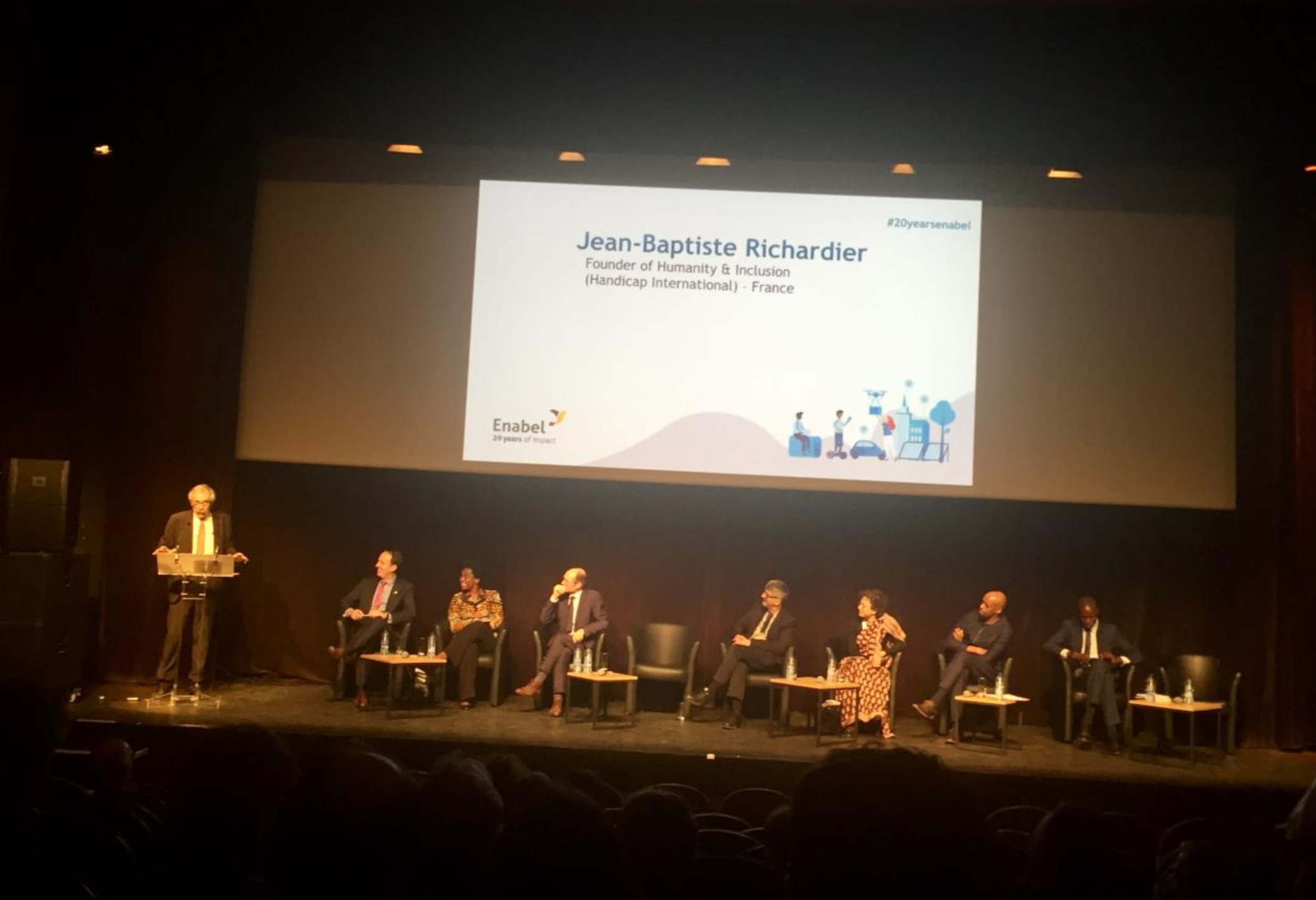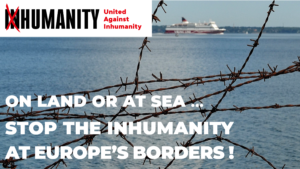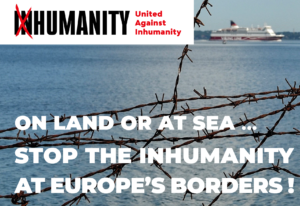On April 3rd, Enabel, the Belgian Development Agency, organised a high-level event to celebrate its 20thanniversary. Panellists where invited to discuss about “what will international development look like in 2040?”
Jean-Baptiste Richardier, member of UAI’s IEC, was one of the panellists*. His speech is available below.
Panel speech of Jean-Baptiste Richardier
co-founder of HI – Humanity & Inclusion and administrator of Humanitarian Alternatives

Your Majesty, Mr Prime Minister, dear colleagues, dear Jean,
Being the last speaker, I am sorry to say that I am going to present a gloomy view of the next 20 years and sounds somewhat pessimistic.
Beyond the satisfaction to have founded a specialized NGO – Handicap International or Humanity and Inclusion as it was renamed recently – my intense involvement in solidarity work was shaped by the set of principles and values that structured contemporary solidarity endeavour.
Once no longer in charge of operations, I co-founded the journal Humanitarian Alternatives, intended precisely to reflect collectively on past achievements and contribute to project our sector in the future, amidst a formidably fast changing environment. By the way, please note that Humanitarian Alternatives last issue is opportunely focussing on“The Urban bomb”.
In choosing the thematic of this roundtable, Enabel is showing exactly what Rakesh Rajanicalls “responsiveness and openness of a government asking itself: What did I learn? Whatdid I do wrong ? What should I change ? What difference my action is making for people?”The humility, curiosity and clout that this endeavour requires, may actually apply to all of us and to each one of our governance.
At this point, allow me to give some visibility to a newly created movement, United Against Inhumanity, initiated by seasoned humanitarian practitioners, former UN employees and a number of academics. In preparation of this roundtable, Martin Barber,former UNMAS Director and author of “Blinded by Humanity”, shared with me is conviction that “development organisations of 2040 will be founded and managed in the regions where they operate. Indeed, if we look at what a number of countries have achieved in economic and social terms in the past 20 to 30 years, we have seen the growth of home-grown businesses and civil society organisations. His belief is that there is no reason why this kind of transformation should not take place elsewhere over the next 20 years. The role of the UN specialised agencies will become more about setting global norms and coordinating global responses to global threats, and less about managing programmes of support to government technical capacity. Similarly, civil society organisations which currently support aid programmes will need to make themselves useful to the local and regional organisations in their fields, or risk losing their relevance”.
Well… That prediction may very well prove to be true, at least in part, if it was not for thedire impact of the global threats that the world is facing. Let’s not forget that underdevelopment has often been intentionally maintained and still is. Let’s face that weare entering at high speed a very tough period in which the “global apartheid”contemplated by some as a solution, would ultimately be a nightmare for all.
Norah Niland, another colleague in UAI, long time humanitarian practitioner andresearcher, told me: “Actually, the bulk of humanitarian action happens currently in armed conflict settings and complex crisis. Tomorrow, given the combination of climate change and erratic weather patterns, growing inequality within and between countries, shifting power equations, intensified globalization, weak global governance and erosion of the rule-based system, it is reasonable to assume that “development” as we know it will have to be re-thought and that the ugly reality of warfare will persist and grow, and with it, thedeath, displacement and devastation of millions…”
Actually, our common belief is the need for citizen action to challenge dysfunctional governance at the local and global level regarding conflicts and raise against the inhumanity of war crimes and their consequences.
This ambition is all the more necessary that the hardest part is yet to come. The consequences of climate change on human beings are finally breaking free from denial, even though we still gladly convince ourselves that the worst can be avoided, or that developed countries will be spared. The foreseeable consequences are still expressed in terms of a rising sea level rather than impacted populations – who yet are, and will beforced to leave their land or their country… Nevertheless it is happening far away or in firmly “contained” settings… and public opinion hesitates between fear and lack ofconcern, dramatization and relief, acquiescence and disgust regarding more stringent immigration policies and examples of criminalization of aid.
Indeed, it is difficult to get a sense of the extent of the current – and especially future –population movements, but we do know that climate disruption exacerbates poverty andtensions where resources are scarce. It threatens the populations’ food security wheretheir dependence on the pace of harvests and local ecosystems – combined with a strong demographic growth and poor infrastructures – is strongest. The inevitable decline in access to water, sanitation, health, education and shelter are crisis drivers that hurt resilience–this surprising ability of populations to endure precariousness– on which all aid policies, falling short of solutions, seem to rely today.
One thing is certain: the prosperous countries will not find solitary salvation, betting on the continuation of their technological and economic superiority, shielded by borders made of walls and barbed wire, tomorrow electrified or surrounded by heavily armed watchtowers… Closing borders and hunting people smugglers have proved a tragic dead- end, costing many human lives and causing resentment and collective shame. The countries that resort to this for protection will gain nothing from the unavoidable destabilization of the countries of first asylum and the distress that they shelter, supported through endless and soulless humanitarian programs, powerless to restore or maintain hope and dignity.
Humanitarian organizations on their part cannot resolve to become accessories to a generalized policy of firmness, nor can they merely reason in operational terms and organizational or technical adaptations. They should continue to reflect the humanist aspirations of their own society, to arouse the desire to help and to allay the fears inspiredby mistruths. To “ the hearts and minds” of public opinion, they must constantly explainthe diverse realities they encounter. And every time they are in a position to do so, they must have the audacity to get involved in initiatives which are favorable to conflict resolution.
Indeed, the “fear of the other” – whom we complacently reduce to a religion, a terrorist threat or a potential profiteer – can only be overcome through a battle of public opinion; we need to kindle empathy rather than compassion, to make people realize that extreme poverty is unacceptable and that for every human being attached to their land, their culture and roots, an endless flight is always a last resort. Therefore, the role of humanitarian actors is also to remind loudly and without naivety the right of every human being to exist, to be rescued and protected, as well as to choose the unknown over the familiar land when displacement, exodus to overcrowded cities or exile, means salvation.
Tomorrow, humanity will have its back to the wall, and wealthiest countries don’t havethe luxury of indifference. A better understanding of the interdependence of countries and peoples teaches us that security cannot be achieved without impactful solidarity, and that a new ambition is necessary – founded on a more equitable sharing of wealth, which fosters stability, social cohesion and peace. Having failed to prevent, humanity must now accept its duty of solidarity. Selfishness would be self-delusion.
On the solution side, I agree with Martin Barber suggesting that “multilateralism of inter- governmental relations may be declining, but new forms of multilateralism are taking its place. One example is the collaboration among cities, another is the collaboration on specific initiatives among civil society groups all over the world, facilitated by access to free communications technology. If United Against Inhumanity is able to imagine a global movement of outrage against the inhumanity of war crimes, it is thanks to thistechnology”. Indeed, it has the potential to bridge gaps between popular demand for morejustice and a somewhat elitist human rights sphere, as rightfully stressed in the social field by Irene Kahn.
Nexus, triple nexus, grand bargain, resilience, localisation, simplification, adaptation… Isthis new jargon a true expression of well-defined attempts to collectively overcome the huge shortcomings of the situation ? A sincere determination to challenge the looming and excruciating problems that the population of the poorest countries are and will be enduring? Or a translation of our collective powerlessness to address the implications of the impasse in which the inhabitants of our planet and their leaders have cornered themselves?
There will be no quick or miraculous fix, and we should place at the top of our agenda the requirement of fraternity and bond between peoples, and our belief in the duty and benefit of mutual help, while we continue to question ourselves and evolve at the contact of our peers and partners in the countries where we are present.
I think that we must regularly reset our collective capacity to truly think out of the box. Leave space for and encourage new initiatives that feel gaps and disrupt establishedwisdoms and quiet beliefs that we are doing the right things. It’s time for modesty,maximum creativity, permanent search and learning, and above all, valorization of local competencies and resources rather than resorting to a dominating offer of readymade expertise and its inevitable shortcomings.
Let us not forget that the most extraordinary and deserving entrepreneurship finds its rootamong people coping with hardship and insurmountable difficulties. “Survival strategies”have no boundaries or limit. They are made of solidarity, frugality and creativity as much as plain courage. We have a lot to learn from the relentless attempt of people in destitute situation to improve the fate of their family and community.
In closing, I remain convinced that we need more empathy than compassion. This is whyamateurism is so essential ; it comes from AMARE meaning “a friendly attitude…”, quitethe opposite of the fears that dominate public opinion. Amateurism means to be willing to reach out to others with genuine empathy ; a desire for taking part ; a will to push to thelimits one’s competences ; to widen the field of the possible ; and to hold non-contractual commitments.
Thank you.
Lul Seyoum, another UAI colleague, founder and executive director of the International Centre for Eritrean Refugees and Asylum Seekers – ICERAS, shared with me the following ideas, unfortunately too late to incorporate them meaningfully in an already long presentation. Given their particular relevance with our discussion on “What will international development look like in 2040?”, I attach them here:
“International development should consider focusing on youth in all continents. With 60% of the entire continent aged below 25, Africa is the youngest continent in the world. It would be a great plan for a better future if these youth members could be groomed to become future servant/intentional leaders. This could be achieved with providing them education, training of all sorts and equipping them with skills for life and addressing the violence of exclusion.
Another group that would need the same attention is the diaspora/migrants/refugees community which could help them to become productive citizens of the host countries and country of origin.
Adopting good practice, gearing towards gender parity and engaging in its implementation. There is an increasing recognition that the causes of conflict are gendered, and that applying a gender perspective in any analysis is essential to tackling conflict at its roots.
It would also be important to add that aid is no longer needed. Please see the book “Aid is the silent killer of growth” by Dambisa Moyo. Aid creates dependency and becomes hard to get out of; it will not help sustained economic growth; it keeps the tyranny going on endlessly because it will add to the bribing officials’ pockets. What is needed is capacity building support, training, building infrastructure, support education, provide healthcare. More of the work needs to be done by diaspora. We could see a world free of Aid to prevent poverty and wars.”
Useful links:
- Humanitarian Alternatives last issue on “The urban bomb”
- United Against Inhumanity (UAI) website.
*Panelists:
- Rakesh Rajani, Vice-President of Co-Impact (co-impact.io)
- Alexander De Croo, Deputy Prime Minister of Belgium
- Irene Khan, Director-General of the International Development Law Organization (IDLO), former Secretary-General of Amnesty International
- Gerald Abilais the Founder of BarefootLaw (https://barefootlaw.org), a multiple-award-winning social enterprise using legal innovations to increase access to justice and law for underserved communities in Uganda.
- Melinda Bohannon, DFID Director of Strategy
- Olivier De Schutter, Co-Chair, International Panel of Experts on Sustainable Food Systems (IPES-Food), Member of the UN Committee on Economic, Social and Cultural Rights
- Dr Christine Kirunga Tashobya, lecturer at Makerere school of public health Uganda
- Jean-Paul Kimonyo, Expert on conflict and post-conflict reconstruction; Senior Advisor on NEPAD Office of the President, Rwanda
- Jean-Baptiste Richardier, founder of Handicap International, Administrator Humanitarian Alternatives (http://alternatives-humanitaires.org/en/)











